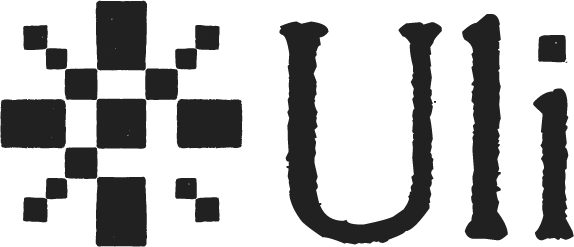This post is adapted from the Uli newsletter updates sent in March and April 2022
We are now very close to bringing to life our machine learning tool that mitigates online gender-based violence (oGBV). We are working with two amazing designers who will use histories, narratives, forms and shapes to further empower this tool and the stories of its community.
We envision the tool’s visual design to encompass all the possibilities and challenges that have hounded us in the past few months, some of which are:
Computing logics and how they are simultaneously reductive, liberating, modest, grand;
Machinic processes and how they appear monstrous, clunky, efficient, useful or incomprehensible depending on the users’ mood and the time of the day;
Community creation, and its ebb and flows;
Through these visuals, we want to find a way to represent everything this tool is going to do!
Here's a vision that we’ve co-dreamed that we want to share with you, and ask you to join us in giving this tool a face and a name.
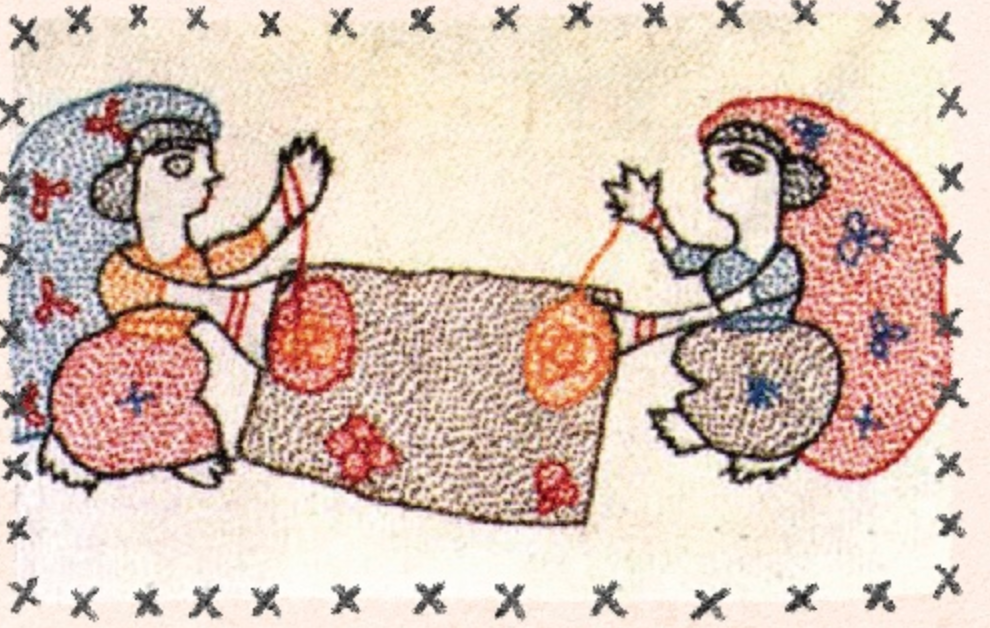 Metaphorically, this tool could be imagined as a quilt-making process, one that reflects intimate, gendered histories of suturing, tailoring, fabricating, stitching, patching, and moulding the world around us. It is a product of emotional labour that tells a story about its creators, and their historical and cultural contexts through its design, materials, and stitches.
Quilts and quilt-making are forms of a cloth-based narrative, art which is part of many cultures. Like this tool, quilts are often made collaboratively, and are both personal and communal objects that empower and celebrate.
Metaphorically, this tool could be imagined as a quilt-making process, one that reflects intimate, gendered histories of suturing, tailoring, fabricating, stitching, patching, and moulding the world around us. It is a product of emotional labour that tells a story about its creators, and their historical and cultural contexts through its design, materials, and stitches.
Quilts and quilt-making are forms of a cloth-based narrative, art which is part of many cultures. Like this tool, quilts are often made collaboratively, and are both personal and communal objects that empower and celebrate.
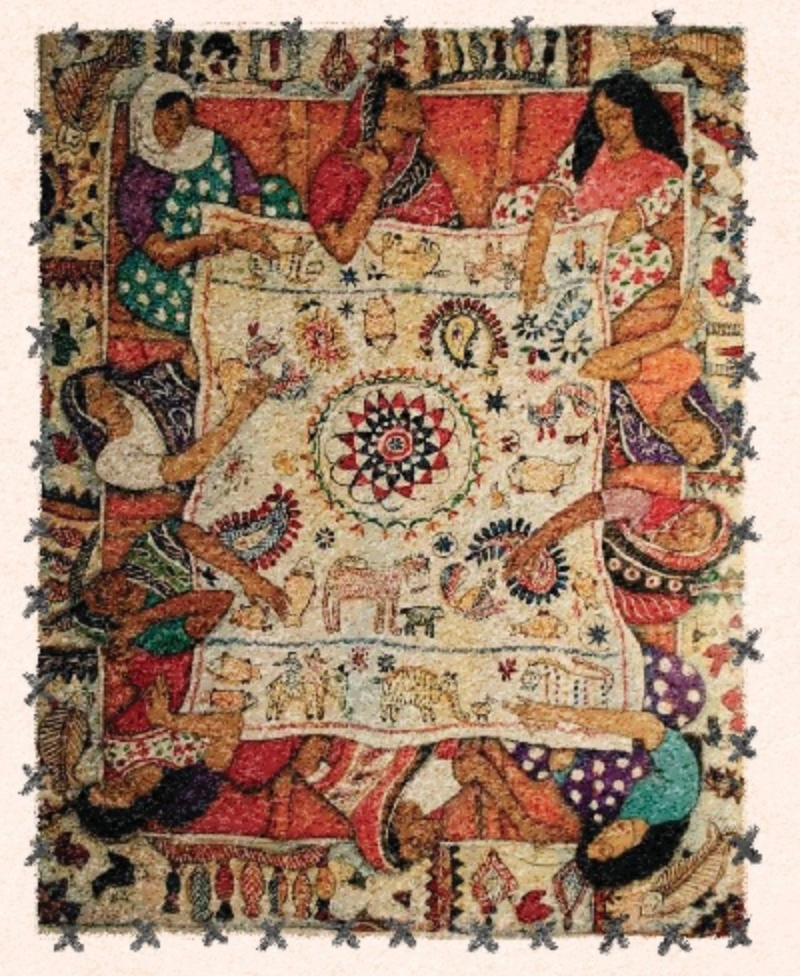 We imagine this tool, like a patch-work, Kantha quilt, to be co-created in a courtyard of womxn, transpersons, dancers, singers, and all those communities that the internet otherwise marginalizes. This courtyard is where all the work of resistance and resilience is celebrated.
We imagine this tool, like a patch-work, Kantha quilt, to be co-created in a courtyard of womxn, transpersons, dancers, singers, and all those communities that the internet otherwise marginalizes. This courtyard is where all the work of resistance and resilience is celebrated.
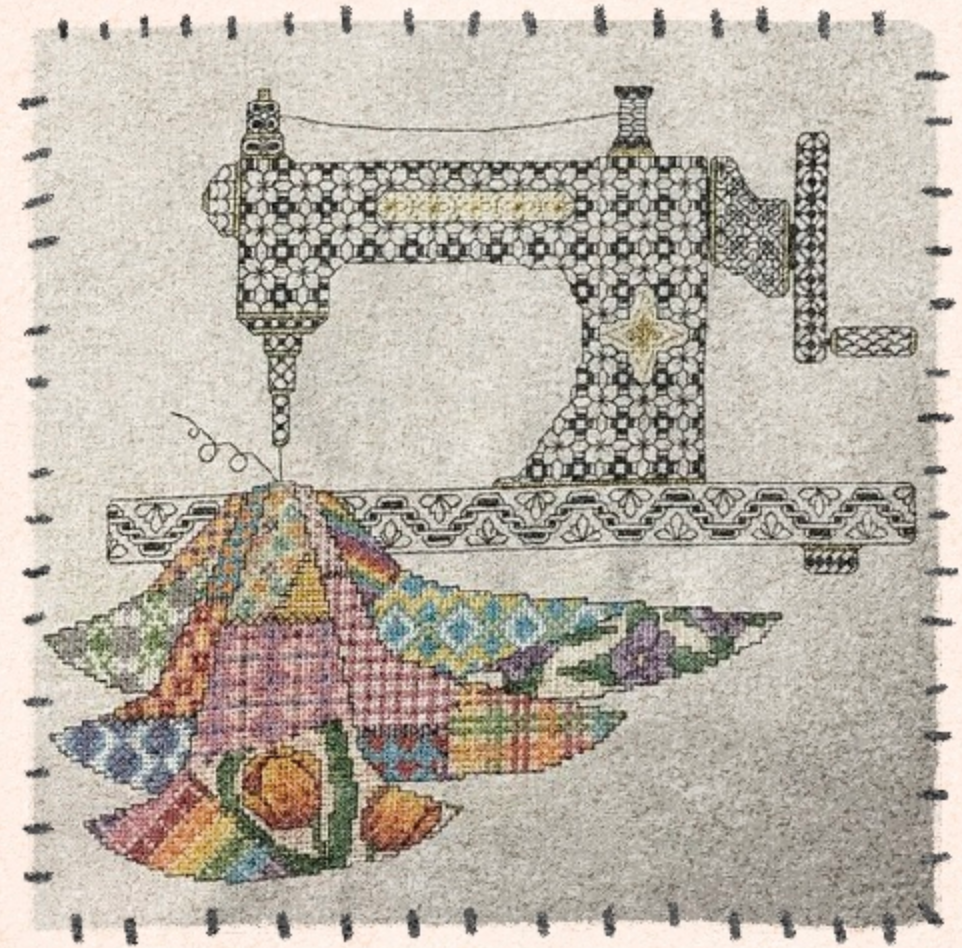 In our vision, we see folks from this community sitting together with their tools and their sewing machines (in our case, AI and machine learning) to stitch beautiful patches together with various patterns and colours inspired by their stories.
In our vision, we see folks from this community sitting together with their tools and their sewing machines (in our case, AI and machine learning) to stitch beautiful patches together with various patterns and colours inspired by their stories.
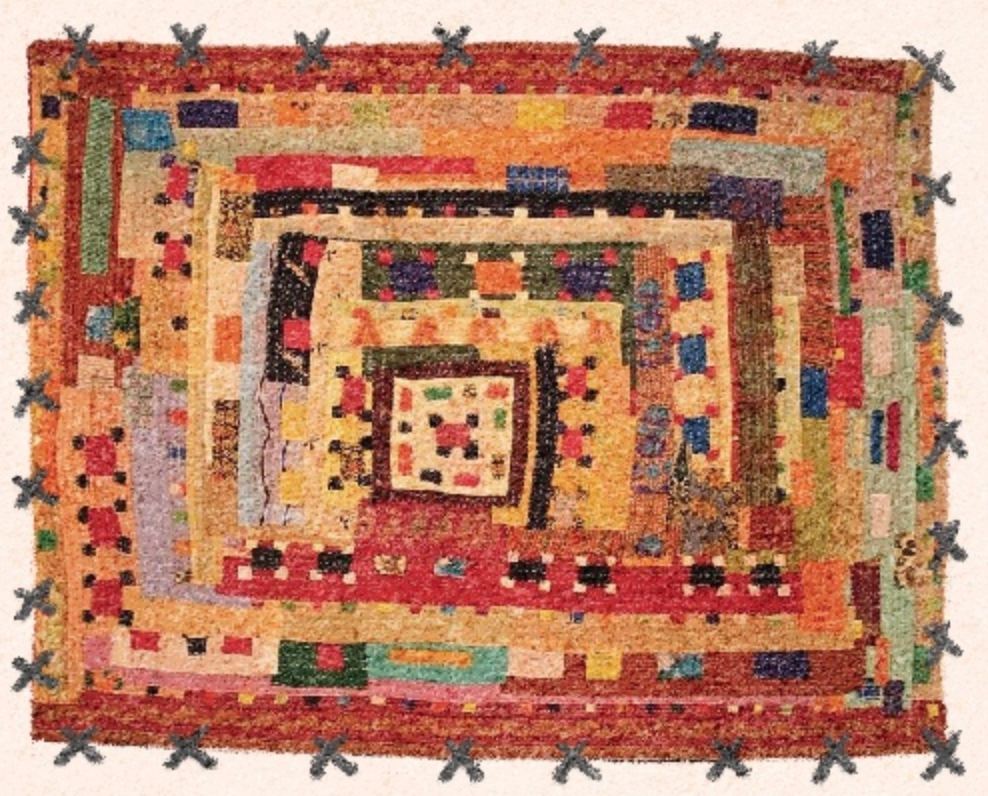 Our tool on Twitter manifests as cloth patches, informed by your diverse lived experiences and stories into layers that can provide some insulation from traumatic words and experiences.
Our tool on Twitter manifests as cloth patches, informed by your diverse lived experiences and stories into layers that can provide some insulation from traumatic words and experiences.
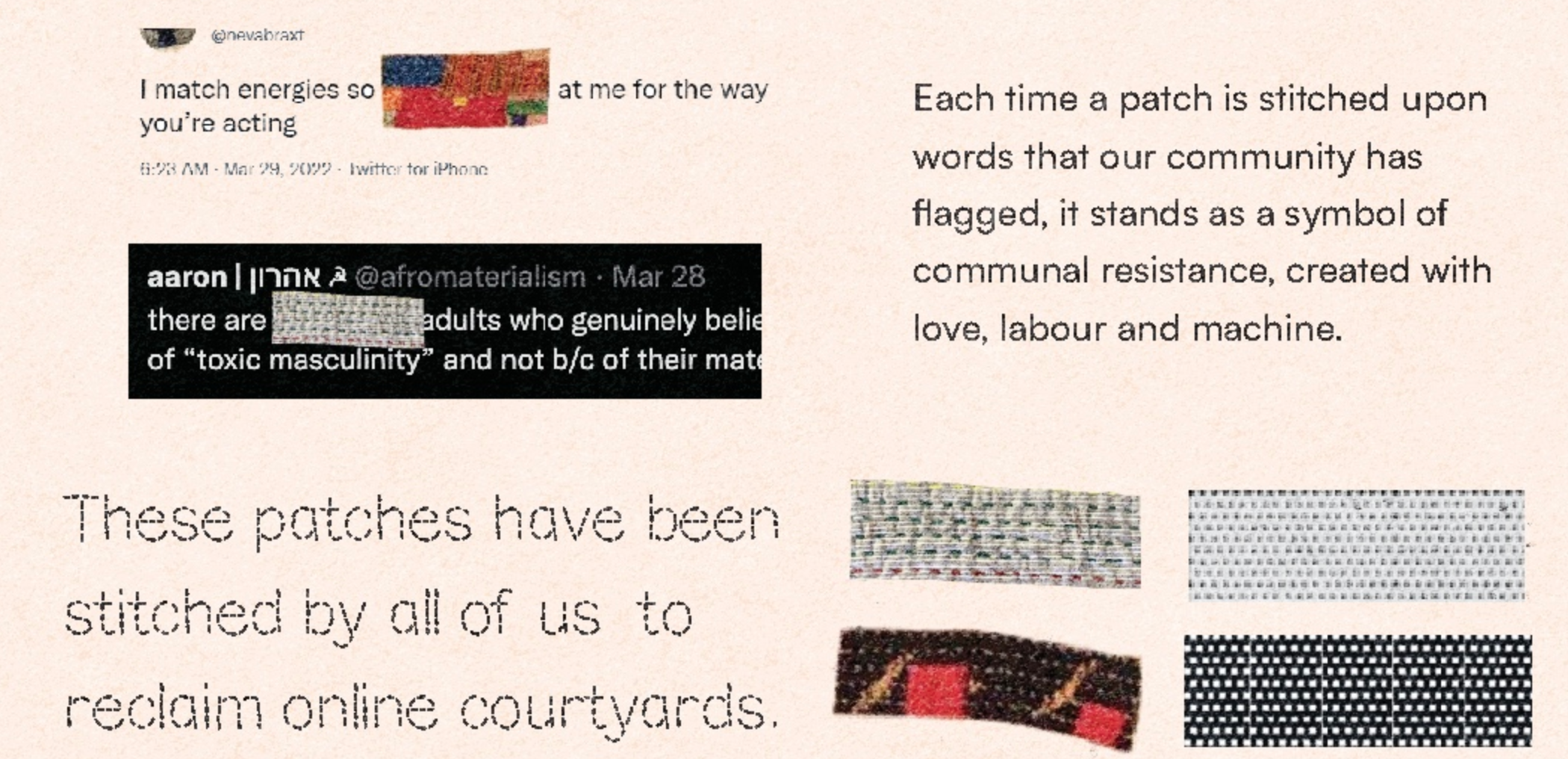 Each time a patch is stitched upon words that our community has flagged, it stands as a symbol of communal resistance, created with love, labour and machine.
These patches have been stitched by all of us to reclaim online courtyards.
A Kantha takes months or even years to be finished, handed down through generations, from grandmother, to mother, to daughter. It is ever-expanding, just like the database of our tool. A completed Kantha provides strength, as this tool aims to do.
In the spirit of co-weaving this tool, we need your perspectives and insights on what a good name and face for this tool could be.
Each time a patch is stitched upon words that our community has flagged, it stands as a symbol of communal resistance, created with love, labour and machine.
These patches have been stitched by all of us to reclaim online courtyards.
A Kantha takes months or even years to be finished, handed down through generations, from grandmother, to mother, to daughter. It is ever-expanding, just like the database of our tool. A completed Kantha provides strength, as this tool aims to do.
In the spirit of co-weaving this tool, we need your perspectives and insights on what a good name and face for this tool could be.
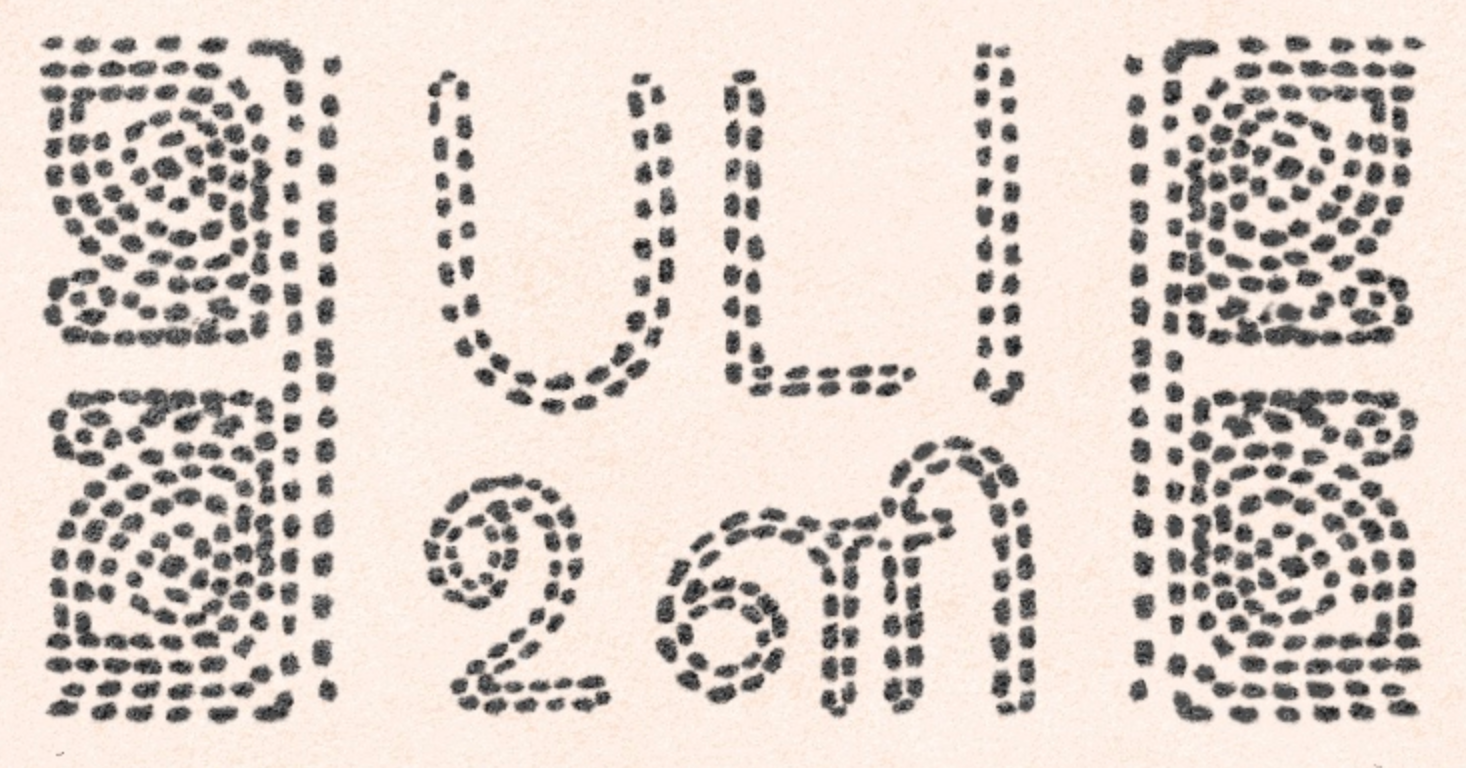 It is a simple tool - a chisel, that allows one to make a room of one’s own or courtyards where people can come together, share stories, and reflect on the future we all want to see. Its logo, whose style is based in the feminist practice of quilt-making, resembles a courtyard of moving ideas and communities. It is an ode to the efforts of different groups, organizations and movements that strive to empower each one of us.
It is a simple tool - a chisel, that allows one to make a room of one’s own or courtyards where people can come together, share stories, and reflect on the future we all want to see. Its logo, whose style is based in the feminist practice of quilt-making, resembles a courtyard of moving ideas and communities. It is an ode to the efforts of different groups, organizations and movements that strive to empower each one of us.
 Metaphorically, this tool could be imagined as a quilt-making process, one that reflects intimate, gendered histories of suturing, tailoring, fabricating, stitching, patching, and moulding the world around us. It is a product of emotional labour that tells a story about its creators, and their historical and cultural contexts through its design, materials, and stitches.
Quilts and quilt-making are forms of a cloth-based narrative, art which is part of many cultures. Like this tool, quilts are often made collaboratively, and are both personal and communal objects that empower and celebrate.
Metaphorically, this tool could be imagined as a quilt-making process, one that reflects intimate, gendered histories of suturing, tailoring, fabricating, stitching, patching, and moulding the world around us. It is a product of emotional labour that tells a story about its creators, and their historical and cultural contexts through its design, materials, and stitches.
Quilts and quilt-making are forms of a cloth-based narrative, art which is part of many cultures. Like this tool, quilts are often made collaboratively, and are both personal and communal objects that empower and celebrate.
 We imagine this tool, like a patch-work, Kantha quilt, to be co-created in a courtyard of womxn, transpersons, dancers, singers, and all those communities that the internet otherwise marginalizes. This courtyard is where all the work of resistance and resilience is celebrated.
We imagine this tool, like a patch-work, Kantha quilt, to be co-created in a courtyard of womxn, transpersons, dancers, singers, and all those communities that the internet otherwise marginalizes. This courtyard is where all the work of resistance and resilience is celebrated.
 In our vision, we see folks from this community sitting together with their tools and their sewing machines (in our case, AI and machine learning) to stitch beautiful patches together with various patterns and colours inspired by their stories.
In our vision, we see folks from this community sitting together with their tools and their sewing machines (in our case, AI and machine learning) to stitch beautiful patches together with various patterns and colours inspired by their stories.
 Our tool on Twitter manifests as cloth patches, informed by your diverse lived experiences and stories into layers that can provide some insulation from traumatic words and experiences.
Our tool on Twitter manifests as cloth patches, informed by your diverse lived experiences and stories into layers that can provide some insulation from traumatic words and experiences.
 Each time a patch is stitched upon words that our community has flagged, it stands as a symbol of communal resistance, created with love, labour and machine.
These patches have been stitched by all of us to reclaim online courtyards.
A Kantha takes months or even years to be finished, handed down through generations, from grandmother, to mother, to daughter. It is ever-expanding, just like the database of our tool. A completed Kantha provides strength, as this tool aims to do.
In the spirit of co-weaving this tool, we need your perspectives and insights on what a good name and face for this tool could be.
Each time a patch is stitched upon words that our community has flagged, it stands as a symbol of communal resistance, created with love, labour and machine.
These patches have been stitched by all of us to reclaim online courtyards.
A Kantha takes months or even years to be finished, handed down through generations, from grandmother, to mother, to daughter. It is ever-expanding, just like the database of our tool. A completed Kantha provides strength, as this tool aims to do.
In the spirit of co-weaving this tool, we need your perspectives and insights on what a good name and face for this tool could be.
Converging on Uli
Uli (“Uli” உளி) was a name suggested by one of our teammates. It is a simple tool - a chisel, that allows one to make a room of one’s own or courtyards where people can come together, share stories, and reflect on the future we all want to see. Its logo, whose style is based in the feminist practice of quilt-making, resembles a courtyard of moving ideas and communities. It is an ode to the efforts of different groups, organizations and movements that strive to empower each one of us.
It is a simple tool - a chisel, that allows one to make a room of one’s own or courtyards where people can come together, share stories, and reflect on the future we all want to see. Its logo, whose style is based in the feminist practice of quilt-making, resembles a courtyard of moving ideas and communities. It is an ode to the efforts of different groups, organizations and movements that strive to empower each one of us.